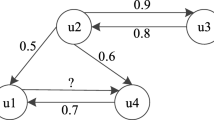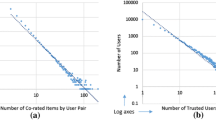Abstract
Social trust holds great potential for improving recommendation and much recent work focuses on the use of social trust for rating prediction, in particular, in the context of the Epinions dataset. An experimental comparison with trust-free, naïve approaches suggests that state-of-the-art social-trust-aware recommendation approaches, in particular Social Trust Ensemble (STE), can fail to isolate the true added value of trust. We demonstrate experimentally that not only trust-set users, but also random users can be exploited to yield recommendation improvement via STE. Specific users, however, do benefit from use of social trust, and we conclude with an investigation of their characteristics.
Access this chapter
Tax calculation will be finalised at checkout
Purchases are for personal use only
Preview
Unable to display preview. Download preview PDF.
Similar content being viewed by others
References
Liu, N.N., Cao, B., Zhao, M., Yang, Q.: Adapting neighborhood and matrix factorization models for context aware recommendation. In: CAMRa 2010, pp. 7–13 (2010)
Ma, H., King, I., Lyu, M.R.: Learning to recommend with social trust ensemble. In: SIGIR 2009, pp. 203–210 (2009)
Ma, H., Lyu, M.R., King, I.: Learning to recommend with trust and distrust relationships. In: RecSys 2009, pp. 189–196 (2009)
Ma, H., Yang, H., Lyu, M.R., King, I.: SoRec: Social recommendation using probabilistic matrix factorization. In: CIKM 2008, pp. 931–940 (2008)
Massa, P., Avesani, P.: Trust-aware recommender systems. In: RecSys 2007, pp. 17–24 (2007)
O’Donovan, J., Smyth, B.: Trust in recommender systems. In: IUI 2005, pp. 167–174 (2005)
Shi, Y., Larson, M., Hanjalic, A.: Towards understanding the challenges facing effective trust-aware recommendation. In: RSWeb 2010, pp. 40–43 (2010)
Author information
Authors and Affiliations
Editor information
Editors and Affiliations
Rights and permissions
Copyright information
© 2011 Springer-Verlag Berlin Heidelberg
About this paper
Cite this paper
Shi, Y., Larson, M., Hanjalic, A. (2011). How Far Are We in Trust-Aware Recommendation?. In: Clough, P., et al. Advances in Information Retrieval. ECIR 2011. Lecture Notes in Computer Science, vol 6611. Springer, Berlin, Heidelberg. https://doi.org/10.1007/978-3-642-20161-5_75
Download citation
DOI: https://doi.org/10.1007/978-3-642-20161-5_75
Publisher Name: Springer, Berlin, Heidelberg
Print ISBN: 978-3-642-20160-8
Online ISBN: 978-3-642-20161-5
eBook Packages: Computer ScienceComputer Science (R0)




